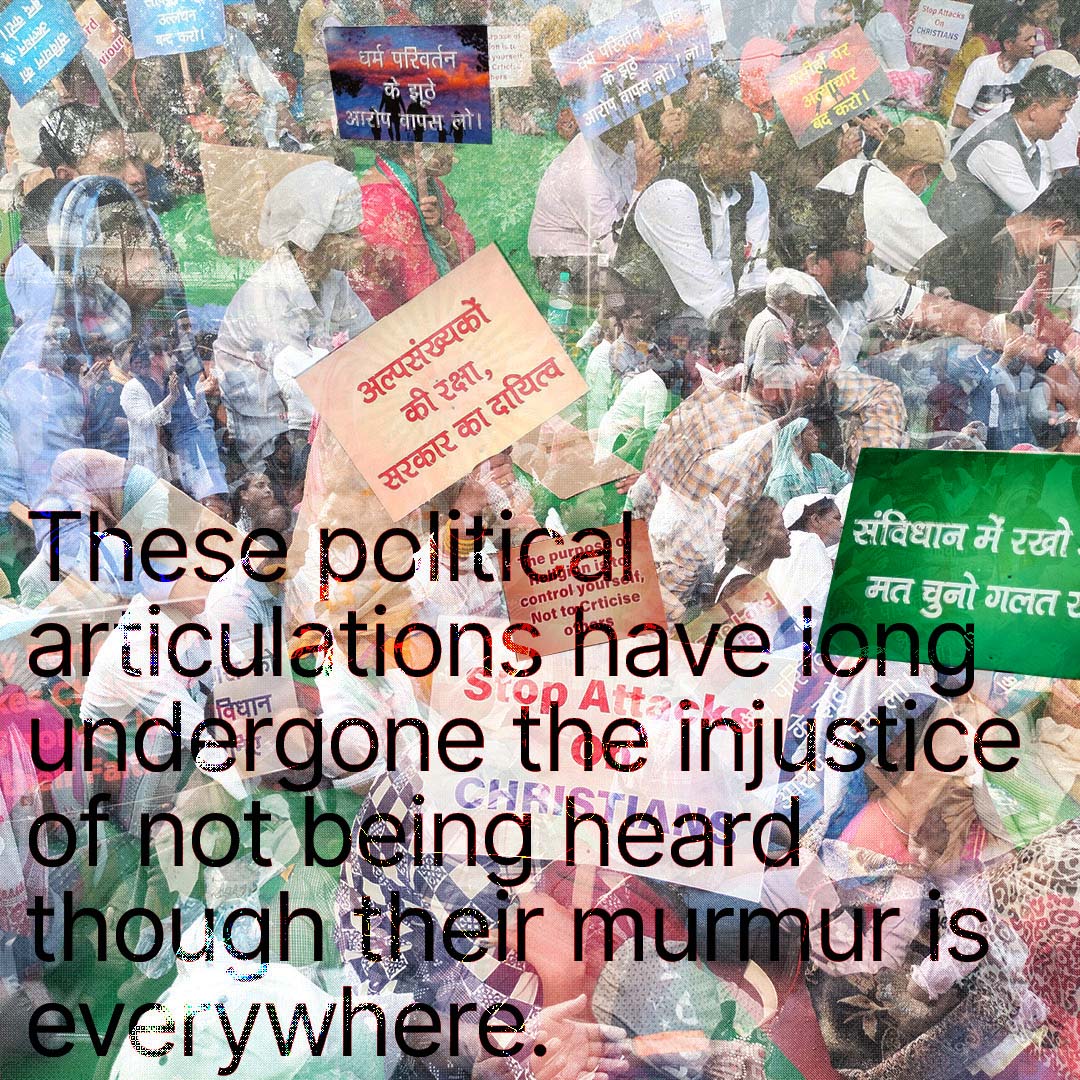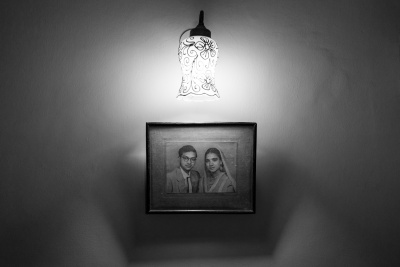Bearing Sonic Witness
In this audio documentary, the author reports from sites of protest and worship in Delhi, India and sonifies the struggles of Dalit Christians to be heard. From bureaucratic spaces to legal courtrooms to public gatherings and spaces of prayer and ritual, each location reverberates with the murmurs of Indian Christian subjectivity and Dalit Christian reality in 2022–23, forming an urgent audible artifact as witnessed, recorded, and constructed by Samuel.
I spent the last year at protests, meetings, and small dusty offices in Delhi where dedicated pastors, nuns, lawyers, social workers, and other Christians have been working to be heard by the State and the wider public. Years of socially sanctioned disenfranchisement, patronization, and silencing have now merged into extra-judicial attacks and carceral laws.
February 19, 2023 saw a mass protest across denominations, languages, and churches to rally against the violent suppression and enforced homogenisation of Christians (Samuel 2023b). At the same time, not a single word about caste was said, even though this year is historical in the multi-decade struggle for Scheduled Castes (SC) status for Dalit Christians and Muslims (Samuel 2022a). These political articulations have long undergone «the injustice of not being heard» (Stauffer 2015, 1) though their murmur is everywhere.1 It is to be heard that Dalit Christians come every year to this migrant city of fleeting faith (Samuel 2023c).
But Indian Christian identity is a flimsy construction defined by negation. It is made solid by appropriating Dalit and Tribal Christian histories of social violence – violence they participate in, even within the church, even in the presence of God (David 2023).
On March 28, 2023 I saw a different silence when I witnessed how no one – neither Ambedkarites2 nor mainstream Christian groups – had come to show support at the nineteenth-ever National Protest for Dalit Christians and Dalit Muslims (Samuel 2023c, 2022a). The ongoing movement for granting Scheduled Caste status for Dalit Christians and Muslims is just one of many examples of how the struggles of this demographic is kept under a bushel, even amongst their own broader faith communities. In this sound documentary, the dialectical tension between the truth about who converts (their risks, reasons, and rights) and who is persecuted (within, without) is heard. These «issues» (Paliath 2022) of persecution and caste status filter through census records, community memory, integration, and legal legibility (Giri 2019), not to mention the ideals of citizenship and secularism. This urgent artifact comprises the muxture (Green 2021) of Indian Christian subjectivity and Dalit Christian reality in 2022–23 from national offices and organizations presidents based out of Delhi. From the protest sites and places of worship, the poetic but hard-headed theologians, the pragmatic yet faithful lawyers, and the «bodies and energies» (Foucault 1979, 134–45) of regular Dalit Christians (past and especially present) as we/ they strive to worship freely.
Timecodes and Translations
00:00–00:43: «Yeshu Masih», a devotional song in Hindi sung by leaders of various Christian sects and churches in New Delhi at a mass protest against the persecution of Christians held on February 19, 2023 in Jantar Mantar, New Delhi (Samuel 2023b).
00:44–02:55: Rev. Dr. Abraham Mathew, Executive Secretary of the National Council of Christian Churches (NCCI), at his office in New Delhi.
02:56–03:21: John Dayal, senior Dalit Christian scholar and activist. He is also one of the spokespersons for the informal coalition between Christian churches and organizations in Delhi advocating against the persecution of Christians in India. Audio recorded on February 19, 2023.
03:22–05:21: Audio from Alliance Defending Freedom India’s video on a mob lynching of religious minorities.
05:22–05:29: John Dayal (#2) discusses the demographics (Lobo 2022) comprising Indian Christians, particularly concerning persecution (Lobo 2003).
05:33–07:37: Sri Harsha Sai Matta, a doctoral candidate at Ambedkar University and my good friend. We like to get filter coffee in Connaught Place and spend hours talking about theology, our families, queerness, and what we’ve been reading lately. So much of Christianity in practice is about fellowship, and I’m very grateful for this space I can share with Harsha that straddles this line. Through these recordings, I hope his wisdom and open heart refresh you as our friendship does for me.
07:38–09:25: Rev. Dr. Abraham Mathew (#2).
09:26–10:34: South Asian Conference on Dalit Christians 2019 Theme Song for the 2019 South Asian Conference on Dalit Christians on February 13 and 14 in Bengaluru. Conceptualized by Fr. Devasagayaraj, and lyrics, music, and vocals by Fr. Thisai Gerry.
10:37–12:08: Testimony of the mistreatment and danger borne by an Adivasi Christian victim of religious persecution in Chhattisgarh during a spate of attacks in December 2022. Followed by a prayer for safety and protection by Michael Williams (spokesperson alongside John Dayal for the coalition of churches and Christian organizations in Delhi coming together to register protest against religious persecution).
12:09–13:18: Numerous choirs from the churches gathered for the February 19, 2023 mass protest and worshiped together in multiple languages, with song and dance. Protest organizers kept telling (in Hindi) the journalists to sit down because we were standing around trying to record the proceedings around us and generally getting in the way.
13:19–14:32: Rev. Dr. Abraham Mathew (#3); jati: caste; upa-jati: sub-caste. The terms are derived from the Sanskrit jāta («born» or «brought into existence»), and indicate a form of existence determined by birth.
14:33–16:34: Supreme Court Advocate and senior Dalit Christian activist Franklin Caesar Thomas (Uttam and Menon 2016) on March 28, 2023 at the National Protest of Dalit Christians & Dalit Muslims (Samuel 2023c) organized by the National Council of Dalit Christians in Jantar Mantar, New Delhi. Franklin is also one of the lead advocates in the case for de-linking religion from Scheduled Caste status for nearly twenty years (Deshpande 2022).
16:35–17:17: Rev. Dr. Abraham Mathew (#4) discusses NCCI mandates and policies.
17:18–22:01: Harsha (#2) talks about common slurs (rice Christian, rice-bags, rice-bag convert, etc.) levied at Indian Christians. Chaddi and sanghi are colloquial terms for right-wing Hindus, especially members of the pan-Indian Hindutva umbrella organization Rashtriya Swayamsevak Sangh (RSS). He also references a personal essay I wrote last year, «A Faith to Bite Into» for the anti-caste journal Mavelinadu, where I discussed how I see myself as more Christian than Dalit (Samuel 2022c).
22:02–23:01: Tamil Ambedkarite song performed on-stage by activists from the National Council of Dalit Christians on the March 28, 2023 demonstration. Followed by chants in Telugu, demanding Dalit Christians to unite, hold strong, and resist.
23:02–23:50: Harsha (#3) shares his thoughts on attending the February 19, 2023 mass protest, his father’s influence, Dr. Matta Suguna Rao’s writing and his idea of Jesus as a political figure.
23:51–26:07: Rev. Dr. Abraham Mathew (#5) talks about hybrid identities, positive rebellion, and explains how politics just means life.
26:08–27:37: Harsha (#4) discusses his multicultural religious identity and the idea that memory can also be a site of identity formation, layered across a Jharkhandi Christian folk song recorded on the February 19, 2023 mass protest.
Epilogue

We demand | we demand | we demand.
The present stretches out before us, eternal and elastic, as we wait for the verdict of the case, for the upcoming elections, for the life we are promised. These archival records and interviews together make up an amateur attempt at sonic ethnography, that is, to develop and display a practice of embodied micropolitical listening (Brooks 2019, 54). Therefore, it cannot contain my voice or impulse to editorialize and explain.This audio commentary however, is my testimony and meaning-making, my concluding thoughts, for now.
- 1. Andrew Brooks (2019, 1), argues that a dismissal of the noisy, often indistinct collective sonicity of a gathering of people is to refuse their very agency and autonomy. Their defiance of order and resistance to consolidation, even coherence, represents a collectivity of voices who «have been ignored, disavowed, and broken».
- 2. Ambedkarites are those who follow the teachings or ideology of Dr B. R. Ambedkar (affectionately referred to as «Babasaheb»), a prominent and unprecedented political Dalit thinker and leader, specifically from the Mahar caste of the state of Maharashtra. Babasaheb was an economist, advocate, organizer, the first Minister of Law & Justice in independent India, as well as the chairman of the committee that drafted the Indian Constitution.
List of References
This audio documentary is part of the virtual exhibition «Norient City Sounds: Delhi», curated and edited by Suvani Suri. Sound edit and mix by Geetanjali Kalta.
Project Assistance: Geetanjali Kalta
Graphics/Visual Design: Upendra Vaddadi, Neelansh Mittra
Audio Production: Abhishek Mathur
Video Production: Ammar
Biography
Shop

Published on September 29, 2023
Last updated on April 08, 2024
Topics
A form of social stratification characterised by hereditary transmission of a style of life which including an occupation, status in a hierarchy, and customary social interaction, and exclusion based on cultural notions of purity and pollution.
A generative practice that promotes different knowledge. One that listens is never at a distance but always in the middle of the sound heard.
About Tunisian rappers risking their life to criticize politics and musicians affirming 21st century misery in order to push it into its dissolution.
From priests claiming to be able to shapeshift into an animal to Irish folk musicians attempting to unify Protestants and Catholics.
Special
Snap

